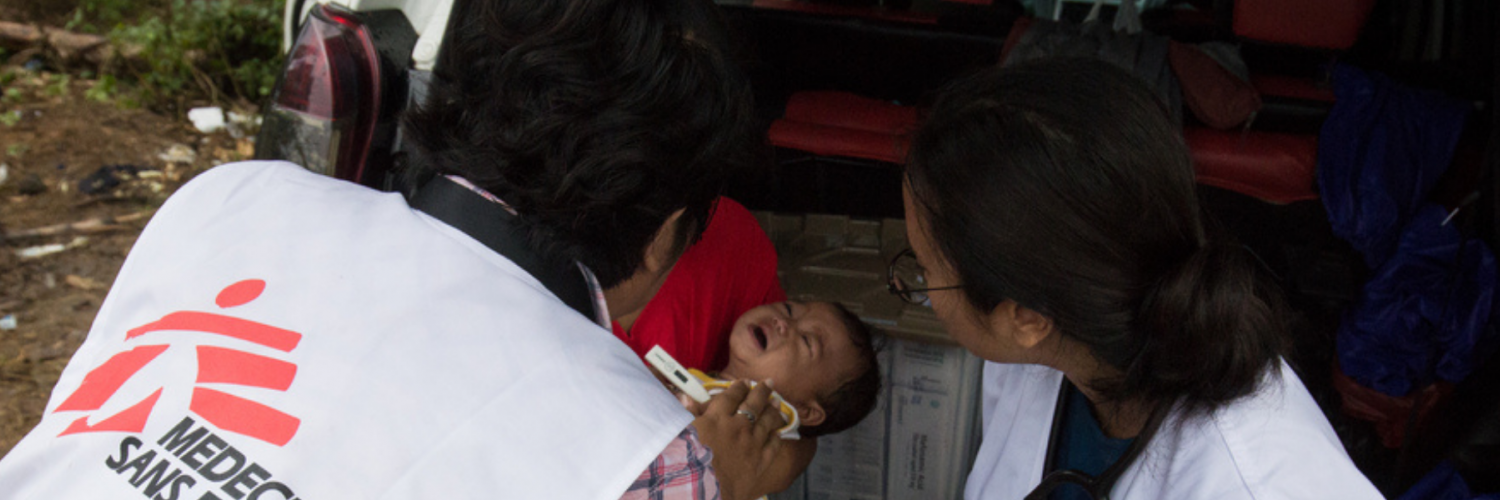Doctors Without Borders / Médecins Sans Frontières (MSF), locally known as Dokter Lintas Batas, started working in Indonesia in 1995, in response to medical needs following a major earthquake on Mount Kerinci in Jambi, Central Sumatra. From 1995 to 2009, the organisation provided medical assistance during emergencies and natural disasters in various Indonesian provinces and, in collaboration with the Ministry of Health, ran projects on HIV/AIDS and tuberculosis.
After returning to Indonesia in 2015, Doctors Without Borders signed an MoU with the MoH focusing on capacity building in adolescent health. Following the COVID-19 pandemic, Doctors Without Borders joined the MoH to respond to COVID-19 in Jakarta and Banten. During this time, the organisation also supported the MoH in emergency response to natural disasters. In 2022, with the conclusion of the Adolescent Health project and the response to COVID-19, Doctors Without Borders began to focus its activities on capacity building for emergency preparedness and response. This project was formalised in the MoU signed with the MoH in 2024.
Timeline: Doctors Without Borders/Médecins Sans Frontières (MSF) in Indonesia
- 1995: Doctors Without Borders started operations in Indonesia when we responded to the needs following a massive earthquake in Mount Kerinci, Jambi. From 1995 until 2009, Doctors Without Borders provided medical assistance during emergencies and natural disasters in various provinces in Indonesia, and in cooperation with the MoH ran HIV/AIDS and tuberculosis projects.
- 2015: In 2015, Doctors Without Borders was back to provide refugee support and respond to methanol poisoning cases and other small scale natural disasters. Doctors Without Borders collaborated with the Ministry of Health (MoH) Crisis Centre and the local government of Aceh for emergency response and assistance in the provision of mental health and psychosocial activities for Rohingya refugees stranded in the Andaman Sea.
- 2016: Doctors Without Borders responded to the needs in the aftermath of the earthquake in Aceh, and undertook a psychosocial education intervention in four sub-districts in Pidie Jaya District, Bandar Baru, Pante Raja, Meuredu, and Tringgading in collaboration with local health authorities.
- 2017: Conducted Psychological First Aid (PFA) training for 32 health workers and 11 Puskesmas, certified by the MoH of the Republic of Indonesia in cooperation with Pidie Jaya District Health Office as part of the response to the Pidie Jaya earthquake.
- 2018: Conducted a series of trainings: 1) Reproductive Health training for teachers and elementary school students in Kepulauan Seribu (Thousand Islands) in collaboration with the DKI Jakarta Provincial Health Office, and 2) Methanol Poisoning training in three cities: Jakarta, Yogyakarta, and Surabaya. Doctors Without Borders also started its adolescent reproductive health project in Labuan & Carita Sub-districts, Banten Province. Meanwhile, local teams responded to earthquakes that struck Lombok Island in July and August, and the triple disaster of earthquake, tsunami and liquefaction that hit Palu, Central Sulawesi in September. In December, following the eruption of the Krakatoa volcano, a tsunami hit the Sunda Strait coast. Pandeglang District, the area where Doctors Without Borders was running an adolescent reproductive health project, was also badly affected. The organisation immediately mobilised medical response teams for those affected by the disaster.
- 2019: Doctors Without Borders continued the adolescent health project in Pandeglang District, Banten Province. The organisation also ran mobile medical teams in the communities affected by the Sunda Strait tsunami that happened in December 2018.
- 2020: Doctors Without Borders adolescent health project in Banten province was extended in a new MoU with the Ministry of Health. With the COVID-19 pandemic, Doctors Without Borders worked with the local health authorities in Banten and Jakarta for trainings of health workers, health promotion, as well as supporting local teams with contact tracing and surveillance, and infection prevention and control. A new element in the coming MoU was also to support the MoH Crisis Centre in capacity building within emergency preparedness and response.
- 2021: Doctors Without Borders continued its adolescent health project in Banten province and the COVID-19 pandemic response in Banten and Jakarta. The team in Indonesia also responded to two natural disasters this year in collaboration with the MoH Crisis Centre: Mamuju and Majene earthquake in West Sulawesi and Semeru Mount eruption in East Java.
- 2022: At the end of 2022, after four years, Doctors Without Borders closed its adolescent health project in DKI Jakarta and Banten and the communities took over the responsibility for running the activities. Doctors Without Borders launched its Emergency Hub (E-Hub) project.
- 2023 – 2024: The E-Hub project was implemented in DK Jakarta & Banten Provinces (2023) and in Aceh (2024).
Emergency Hub (E-Hub) Project
The E-Hub project, known as the Capacity Building Hub for Emergency Preparedness and Response, is dedicated to creating educational opportunities for health crisis and disaster responders. The primary goal is to enhance community resilience, preparedness, and the responders' ability to handle emergencies professionally within Indonesia.
Currently, Doctors Without Borders is actively involved in five specific domains, jointly identified with the Ministry of Health (MoH). These domains address gaps where Doctors Without Borders can share its institutional expertise during emergencies:
- Medical Emergency (including the EMT (Emergency Medical Teams) setup, mass casualty incident management, outbreak management)
- Mental Health and Psychosocial Support (MHPSS) in emergency contexts, and non-specialised counselling for impacted population
- Data Management and Geographic Information Systems (GIS), basic and intermediate skills.
- Environmental Health (focusing on Water Hygiene and Sanitation, and Waste Management for healthcare facilities)
- Health Logistics for effective health crisis preparedness and response.
The target audience for these training programs includes emergency responders from Province and District Health Offices, Primary Health Centers (Puskesmas), Public Hospitals, universities, local NGOs, and other relevant agencies who work in emergency preparedness and response across Jakarta, Banten, and Aceh provinces; the MoH staff, including MSF (both staff and peers) and other humanitarian actors.
In 2024, the E-Hub team conducted 24 training sessions, including Training of Trainers (ToT) programs, successfully training a total of 578 participants by year's end.
[Updated December 2024]
